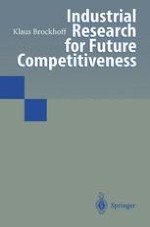1997 | OriginalPaper | Buchkapitel
Conclusions
verfasst von : Prof. Dr. Klaus Brockhoff
Erschienen in: Industrial Research for Future Competitiveness
Verlag: Springer Berlin Heidelberg
Enthalten in: Professional Book Archive
Aktivieren Sie unsere intelligente Suche, um passende Fachinhalte oder Patente zu finden.
Wählen Sie Textabschnitte aus um mit Künstlicher Intelligenz passenden Patente zu finden. powered by
Markieren Sie Textabschnitte, um KI-gestützt weitere passende Inhalte zu finden. powered by
Business has become increasingly technology-dependent. The generation of new technological knowledge as a source of competitive advantage has become a bottleneck in many firms. This could reflect a long term trend (Brockhoff, 1996a). A natural response to this trend might be to strengthen research and development activities both inside and outside the firms. With respect to its long term potentials, research could be expected to take a prominent position in a program for growth and better future competitiveness. But on the contrary, as often before, recent reactions to environmental and competitive pressures as well as the rediscovery of shareholders’ claims, particularly in the U.S., have cast industrial research and development into disfavor. Research, in particular, has come under severe pressure, now having been substantially reduced in many firms and entirely eliminated in others. While research directors have been fighting against this development, they have found few weapons with enough power to convince seasoned managers of other functional areas, controllers, outside directors or CEO’s. Until now, management science has had little to offer that would help support the views of either side in these battles for scarce resources. The specific characteristics of research cause this activity to be pushed out of the annual planning rounds: these favor more regular business activities having promising results in shorter time, a higher probability of success, and much better chances almost fully appropriating the results that follow from the input of various factors of production.
